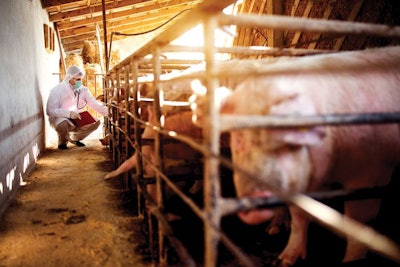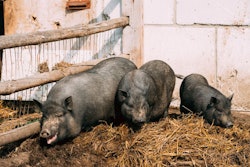
In Asia, African swine fever (ASF) has been detected in domestic pigs in two provinces of China, as well as in East Timor.
Three African swine fever (ASF) outbreaks have been confirmed by China’s agriculture ministry. These represent an apparent return of the infection to the provinces of Henan and Sichuan after a period of absence.
According to the latest official reports from the ministry to the World Organization for Animal Health (OIE), the presence of the ASF virus was confirmed after 252 pigs died on a farm in the Sanmenxia region of Henan. More than 110 other pigs there were destroyed. Illegal movements of pigs were blamed for the new outbreak.
There have been two new outbreaks in Sichuan province. As reported last week, the first was in a group of 111 pigs tested at a highway checkpoint in the Leshan district. Seven of these animals died, and the rest have been destroyed. The next day, the virus was detected among 120 pigs in a village in the district of Luzhou after 12 of the animals died. These outbreaks were also attributed to illegal animal transportation.
China: Improving ASF situation in previously affected regions
For the first two months of 2020, China had reported fewer ASF outbreaks than in the same period of last year, reported Xinhua in early March. The first cases of this year involved a group of seven wild boar found dead in Hubei province.
In the past week, China’s agriculture ministry has informed the OIE the disease situation has been “resolved” in seven areas. These covered the provinces of Chongqing, Guizhou, Inner Mongolia, Liaoning, Shaanxi and Yunnan. In December 2019, the ASF situation in Sichuan was regarded as resolved one week after a group of infected pigs was revealed at a highway checkpoint in Luzhou.
More ASF cases in East Timor
A further 26 ASF outbreaks in East Timor (Timor Leste) have been confirmed by the agriculture ministry to the OIE in the past week. These were detected in 12 municipalities across the state as the result of random testing between September and December last year. Numbers of animals are not reported. Treatment and disinfection were reportedly offered, and transportation of live pigs and pork products have been banned.
In September 2019, the ministry reported to the OIE the nation’s first occurrence of ASF. A cluster of around 100 outbreaks was confirmed in the capital, Dili. Of the estimated 44,000 pigs kept by smallholders in this area, more than 400 animals died.
ASF has killed approximately 1,600 pigs in East Timor, according to the United Nations’ Food and Agriculture Organization (FAO).
South Korea’s ASF cases in wild boar exceeds 400
Over the past week, the agriculture ministry in South Korea has confirmed to the OIE that a further 57 wild boar found dead have tested positive for the ASF virus. Confirmed in the period March 11-18, they were found in the previously affected areas of Yeoncheon and Paju in Gyeonggi province, and in the Hwacheon area of Gangwon. These are heavily forested areas in the north of the country.
Based on official reports to the OIE, these latest cases bring South Korea’s total number of confirmed ASF cases in wild boar to 406.
Russia destroys more wild boar in Far East
One further case of ASF in wild boar has been reported by the Russian agriculture ministry to the OIE. This was confirmed at the end of February. The animal — along with 18 others — was destroyed in a forest in Primorsky krai, a region in the Far Eastern federal district.
Vietnam’s government aims for cheaper pork
Pork prices have recently risen to as high as VND82,000-85,000 (US$3.53-3.66) per kilo in the north of the country, reports Vietnam News. ASF outbreaks since February 2019 have led to the culling of approximately six million of the nation’s pigs, leading to a shortage in domestic pork supplies.
Last week, Prime Minister Nguyen Xuan Phuc announced that the government will introduce measures to lower the price to around VND60,000 to reduce pressure on consumers. As well as offering incentives to Vietnam’s farmers and producers to increase the pig population back up to 32 million, the government is considering increasing the volume of imports, and limiting exports.
View our continuing coverage of the global African swine fever situation.


















